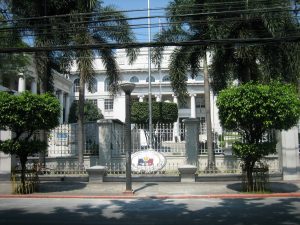Less than two weeks after Ferdinand Marcos Jr.’s resounding win in the Philippines presidential election, human rights activists have asked the country’s Supreme Court to block him from being proclaimed president, over a 1995 conviction for tax evasion.
The petition claims that Marcos should be barred from running for president because he was convicted of failing to file tax returns in the 1980s and then failing to declare the conviction.
The Commission on Elections (Comelec) has already dismissed eight complaints that sought to bar Marcos from running in the election. But on Monday, not long after the son of the former dictator won a landslide victory in the May 9 poll, the petitioners elevated the case to the nation’s highest court, requesting that it block Congress from proclaiming Marcos as the next president.
“Elections are more than a numbers game,” states the 70-page petition, a copy of which was released to the media yesterday. “The will of the people as expressed through the ballot cannot cure the vice of ineligibility. The balance must always tilt in favor of upholding and enforcing the law.”
The petitioners, led by former Supreme Court spokesperson Ted Te, are made up of former opponents and victims of Marcos’ father, Ferdinand E. Marcos, who ruled the Philippines for 21 years. During 14 years of Martial Law introduced in September 1972, Marcos Sr. oversaw the murder, imprisonment, and torture of thousands of Filipinos, and sucked billions from the national accounts. Marcos was removed from power by an army-backed public uprising in 1986, and died in Hawaiian exile three years later.
In 1995, after having returned to the Philippines, Marcos Jr. was convicted of failing to pay income tax and file tax returns while he was a youthful governor of Ilocos Norte from 1982 to 1985, in the final years of his father’s rule. The conviction was upheld on appeal in 1997. Petitioners allege that he lied when he said he had not been convicted of any crime, which they say carries a lifetime ban from seeking public office.
As the petition claims, “We might as well write off our election laws if the voice of the electorate is the sole determinant of who should be proclaimed worthy to occupy elective positions in our republic.” The petitioners say that the presidency should instead be awarded to the second-placed candidate, current Vice President Leni Robredo: “The second-placer in the vote count is actually the first-placer among the qualified candidates.”
Should the Supreme Court approve Te’s petition, overruling Comelec’s previous rulings, it would overturn a resounding victory by Marcos. Provisional election data shows him to have prevailed by a wide margin, leading with 31.1 million votes compared to Robredo’s 14.8 million.
One problem facing the petitioners is that the Supreme Court is currently on a writing break and is set to resume only in June, after the point at which Congress will have officially proclaimed Marcos the next president. According to the timeline for the 2016 presidential election, Congress will declare Marcos winner of the presidential election by the end of this month.
In any event, it would be surprising if the Supreme Court were to uphold the petition, given that Marcos has run for office numerous times since the conviction, and has successfully been elected governor, congressman, and senator. He also made an unsuccessful bid for the vice presidency as Duterte’s running mate in 2016.
Looming behind this is the broader question of what impacts the disqualification of would have. Marcos has based his candidacy on a rejection of traditional centers of authority, including the mainstream press and the country’s liberal elite. Were the Supreme Court to remove Marcos via legal means, after political means have failed, it would prompt not just a constitutional crisis but very likely mass political unrest also.

































